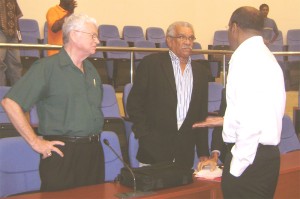Nobel Laureate Derek Walcott yesterday implored the region’s governments to resist prostituting themselves to foreign investors, warning that giving into tourism-fuelled gentrification would spell disaster.
“The prostitution is a thing we call development,” he said in stinging remarks delivered during an impromptu presentation at the grand opening of the CARIFESTA X Symposia, at the National Convention Centre. He warned: “Don’t let this continue, [because] something serious is going to happen.”

Walcott took the view that investors should also be encouraged to put money into the development of cultural infrastructure, like museums and theatres. He also challenged regional governments to be more supportive of artists, saying that younger people needed to have access to more scholarships.
Walcott, who had once famously called for the scrapping of the festival, was featured as the Distinguished Guest at the symposium. Nonetheless, he admitted that he still harboured serious reservations about the fate of artists afterward. Indeed, he blamed the regional governments and institutions for keeping artists in what he described as a state of deprivation. “Is this what we are celebrating?” he asked. “You are killing your artists.”
His comments were later taken up by President Bharrat Jagdeo, who urged that the governments’
commitment to the sustaining culture be viewed within the context of the challenge of development against often harsh economic realities. This led to a fiery, albeit brief exchange between the two. Walcott refused to accept the President’s arguments, which he said he had heard from politicians since his youth.
“It all boils down to money,” Jagdeo said, adding “I wish everything could be done at the same time.” In this vein, he added that CARIFESTA served to help raise levels of awareness and helped people to appreciate how culture could change the nature of their lives. “We are hoping that CARIFESTA adds to the cultural infrastructure,” he said.
The President, who officially opened the ceremony, said sustaining artistic achievements is a challenge for the region, which is trying to balance development with the harsh economic realities. He did, however, note that there is great potential in investing in culture. He pointed out that there is a growing market for cultural tourism that could generate more revenue than the manufacturing sector alone. “My government is determined to support the arts, however parlous our economic situation,” Jagdeo reassured.
But Walcott challenged regional leaders to pursue development of the arts simultaneously. Though he was not optimistic that the idea would be realized, he said it was important for them to adopt a change in attitude. He said there be should be no question of competing needs; that governments should do both.
Walcott had originally declined an invitation to speak in favour of a reading from his works.
He also suggested yesterday that the governments consider putting a moratorium on the festival in order to ensure that it is professionally organized and that it features the best people that the region can offer. “You need the best,” he said, before quickly adding, “But it is self deception, because what happens afterwards? What are their futures?





